MAGAZINE Preschooler.RF
Summary of a lesson on speech development in the senior group on the topic: “All professions are important, all professions are needed”Goal: to deepen students’ knowledge about agricultural work.
Tasks:
Educational:
- deepen students' knowledge about agricultural professions: milkmaid, poultry house, groom, shepherd, grain grower, pig farmer, beekeeper, about the work of people in the village:
- practice naming professions and actions of people of different professions
- consolidate the ability to compose stories using a memory table.
Educational:
- develop speech, memory, attention, thinking, cognitive interest
- tactile sensations, fine motor skills, interest in completing tasks.
Educational:
- to cultivate respect for working people, the ability to appreciate their work and the desire to work for the benefit of people, to form moral qualities of the individual - patriotism.
Methodical techniques:
verbal: teacher’s story, literary expression, compiling a story using a mnemonic table, asking riddles.
gaming: surprise moment, didactic games: “Guess by touch” . “Say the sentence” , “Who says so” , “Gather the harvest” , TRIZ game “Good - bad” , “Guess the profession”
visual: use of objects: food - toys, plot picture, object pictures, mnemonic table.
Practical; work with mnemonic table, application
TSO: TV, video material.
Material:
- box – parcel, toys – food
Preliminary work: reading fiction, watching educational programs, asking riddles, drawing pets, looking at pictures and illustrations.
Progress of the lesson:
Teacher together with the children: We will stand in a circle together, We need to say hello. I say “Hello!” ,
Smile back quickly. Hello, right hand, Hello, left hand, Hello, friend, hello, friend!
Hello, our entire friendly circle!
There's a knock on the door. They bring the parcel.
Educator: Children, would you like to know what is in this package?
Let's try to guess by taking out what lies here with our eyes closed and touching it.
Children take items out of the package and guess egg, bread, chicken, cheese and other toy items by touch.
Educator: how can you call this in one word? (products)
Guys, almost each of you vacationed in the village in the summer. You breathed fresh air, swam in the river, picked berries and mushrooms. In the mornings we drank fresh milk, ate homemade sour cream, cheese, and cottage cheese. But have you ever wondered where these products come from?
Agricultural workers put a lot of work into growing a good harvest so that domestic animals produce more milk, meat, and eggs. Their work is not easy and requires a lot of effort and time.
Today we will get acquainted with different professions in the countryside.
There is a story picture hanging on the board
Educator: In the village there is such a profession - farmer. Who is a farmer? A farmer is a person who runs a farm and supplies people with vegetables and fruits, meat and milk. The farmer has a large farm: there are cows, goats, sheep, pigs, horses, and poultry. It is not easy for a farmer to manage a large number of animals and birds, but his work is necessary and important.
Educator: There is also a profession - vegetable grower. What do you think a vegetable grower does? (a person who grows vegetables).
What does a vegetable grower need to know and be able to do? (how to cultivate the soil, water, care for crops, harvest and store vegetables)
Game "Harvest"
Children are divided into two teams and stand in two columns. Opposite the teams, at a distance of 4-5 meters, vegetables and fruits are placed in hoops. Each team
a basket where you need to collect the “harvest” . On command, the first participants run to the hoop, take an object, run around the hoop and return back. As soon as the previous player put the item in the basket and touched the shoulder of the next player, that player runs to the hoop, etc. The team that “harvests the harvest” .
Educator: Guys, have you heard of such a profession as a beekeeper?
What is he doing? (a beekeeper breeds bees, cares for them, collects honey)
That's right, guys. Beekeepers also receive beeswax, royal jelly, and bee venom, which is used in medicine.
Listen to poems about the beekeeper “Aunt Tanya is the beekeeper, She brings us delicious honey, Linden, buckwheat,
So as not to take sick leave"
Honey is a special healthy, tasty product that has been produced since ancient times, even in Mordovia. And it was called - beekeeping -
the oldest craft and the original form of cultural beekeeping - based on keeping and breeding bees in the sides, specially hollowed out artificial hollows in growing trees such as pine, linden, oak, aspen, adapted for this purpose.
Display of video material about the activities of the ancient Mordovians
TRIZ game “Good - bad” .
Honey is good - Why?
Children's answers (honey is healthy, tasty, sweet. Delicacies are made from it and used to treat diseases)
Honey is bad - Why?
Children's answers. (honey can cause allergies, it’s sticky, you can’t eat too much)
Educator: What should a beekeeper be like? (strong, resilient, skillful, brave and healthy, etc.)
Where does the beekeeper work? (in the apiary)
What are bee houses called? (hives)
What does a beekeeper need to work? (Special clothing and a hat with a protective net, as bees can sting a person)
Educator:
- And there is also the profession of florist. What do you think he does? (children's answers)
This is a person who grows flowers, knows the varieties of flowers
(Slide with the profession Florist)
Physical school
— Flowers of unprecedented beauty grow in the meadow. (Stretching arms to the sides)
Flowers reach for the sun. Stretch with them too. (Stretching arms up)
The wind blows sometimes, but that's not a problem. (Waving hands)
The flowers bend down and drop their petals. (Tilts)
And then they get up again and still bloom (V. Kovalko)
Educator: Who do you think might own the words: “It’s time to milk the cows” ? (children's answers)
That's right, these words are spoken by the milkmaid. Listen to poems about the milkmaid.
“In the morning the sun shines brightly, The milkmaid carries the milk, Warm, cow’s milk, Good for the children’s health.”
(Slide milkmaid profession)
Tell us about the work of a milkmaid using a mnemonic table (there is a mnemonic table on the board)
Children's stories.
The teacher summarizes: A milkmaid is a specialist in milking cows. She milks them, carries out hygiene procedures, feeds them, and makes sure that people receive fresh and healthy milk.
-What does the milkmaid need for her work?
Children's answers. (Milk machine, buckets, milk cans.)
Educator:
— Guys, who takes care of the cows? (cattleman)
- What about the horses? (groom). For pigs? (pig farm). For poultry? (bird bird). That's right, they clean, clean up after the animals, feed them.
- Guys, who grazes the cows, horses, sheep? (shepherd).
D/i “Finish the sentence”:
Bread is baked from... (flour). Wheat grows on... (field) Eggs are laid by... (chickens, geese, ducks) Sour cream is made from... (milk, cream)
Milk is given by ... (cow, goat) Horses live in ... (stable) Pigs live in ... (pig sty)
Educator:
- Well done guys, you completed the task! That's how many different professions we learned! Let's consolidate this knowledge by playing the game "Guess the Profession" .
Didactic game “Guess the profession”
Educator:
— The rules of the game are very simple: I will throw the ball and say a phrase, and you must think and quickly answer which person in the agricultural profession says that and throw the ball back to me. Well, let's begin:
— It’s time to plant tomato seedlings in the greenhouse (vegetable grower) — The hives need repairs (beekeeper) — We need to feed the cucumber seedlings (vegetable grower) — Spring has come. Need to plow the field (tractor driver)
- Today I collected a lot of linden honey (beekeeper) - I need to water the flowers (florist) - I’ll go and clean the cows’ stall (cattleman) - It’s time to give food to the horses (groom)
Educator:
Guys, today we got acquainted with agricultural professions. Every work is important and necessary. Agriculture supplies the entire country with vegetables, oils, meat, milk and much more. We should be everyone who works in the countryside, because it is very hard work.
Guys, to consolidate our knowledge, I suggest we make an application.
A farm was drawn on whatman paper in advance; the children had paper figures of animals, birds, vegetables, and bees on their tables. The children pasted pictures onto the panels.
So our conversation has come to an end. You guys are great today, you did a great job. Let's admire the farm.
Reflection.
Were you guys interested? (children's answers)
If you liked the lesson, everything was easy and clear - show a happy smiley, and if not, show a sad one.
Children evaluate their achievements
List of used literature:
- Alekseeva M.M. Yashina V.I. Speech development of preschool children. - M.: Academy, 2000. - 159 p.
- Arushanova A.G. Speech and verbal communication of children: A book for kindergarten teachers. - M.: Mozaika-Sintez, 2000. - 272 p.
- Dvinyaninova Yu.A. Creative games in older preschool age // Preschool teacher. - 2009. - No. 12. — P. 43-47.
- Gerbova, V. Speech development in kindergarten. 5-6 years old Senior group / V. Gerbova. - M.: Mozaika-Sintez, 2015. - 144 p.
- Ushakova, O.S. Speech development in children aged 5-7 years. Program, conc. busy, method. recommendations (according to Federal State Educational Standards), additional / O.S. Ushakova. - M.: TC Sfera, 2015. - 272 p.
- Ushakova, O.S. Introducing preschoolers to literature and speech development. Activities, games, method. recom., monitoring / O.S. Ushakova. - M.: TC Sfera, 2015. - 288 p.
- . Ushakova, O.S. Development of speech and creativity in preschoolers. Games, exercises, lesson notes / O.S. Ushakova, N.V. Gavrish. - M.: TC Sfera, 2015. - 176 p.
- Shvaiko G.S. Games and exercises for speech development / Ed. V.V. Herbovaya. - M.: Education, 2000. - 40s
| Next > |





